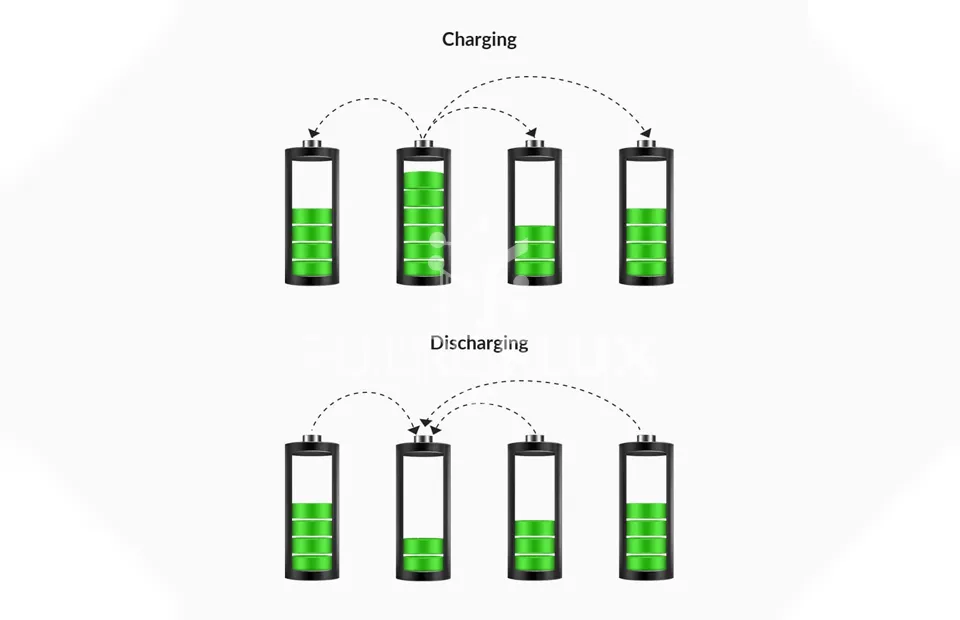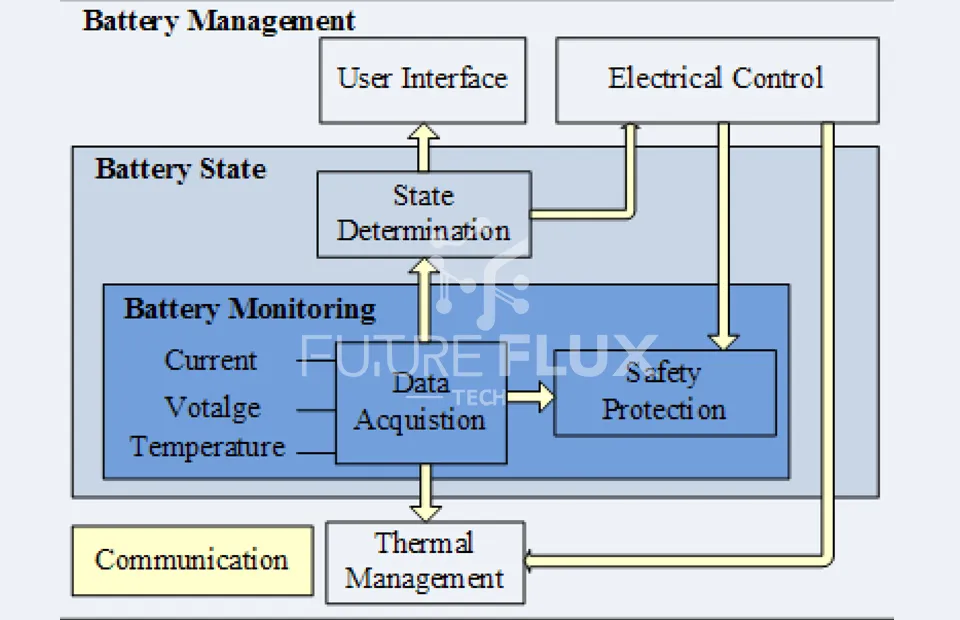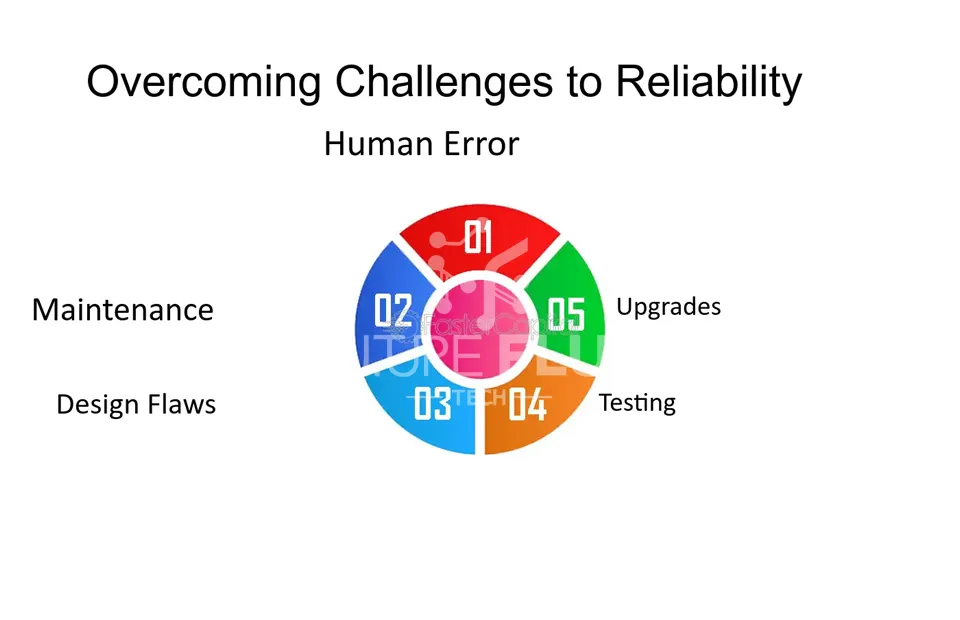The battery management system or commonly known as BMS highly impacts the performance and safety of electric vehicles (EVs). Indeed, it becomes crucial to understand the working of BMS as the global consumption of electric vehicles increases. This particular blog is dedicated to the battery management systems, their responsibilities, and how they are used to properly manage electric vehicles.
What is a Battery Management System?

Battery management system is an electronic system that has a special purpose to control and protect rechargeable batteries including the lithium-ion battery by detecting the state of the battery pack, calculating the secondary information, controlling the battery’s environment and balancing it. Consequently, referring to electric vehicles, a BMS guarantees the operation of a battery that is safe and efficient.
Significance of Battery Management Systems for Electric Vehicle systems

1. EV Battery Safety
Battery safety is of great importance in order to reduce the cases of accidents as well as longevity of the EV. The BMS is actively observing the battery parameters including voltage, current and temperature to counterbalance the events that may cause battery failure. Some of the known mishans that should be avoided in battery usage include overcharging, over discharging and overheating of the batteries since they cause fires and explosions.
2. Battery Pack Safety
BMS plays a major role in maintaining battery pack safety by controlling charge and discharge programs of batteries. In this way, the BMS ensures batteries’ longer life span and eliminates possible dangerous situations when batteries are used beyond their safe operating zone.
3. Battery Parameters Monitoring

Assessing the battery parameters is one of the key tasks of the BMS design motorcycle battery. These include the battery’s state of charge (SOC), state of health (SOH), as well as other important parameters. It also enables the anticipation of battery performance and schedules the routine maintenance to occur instead of waiting for a failure to happen.
4. Thermal Management in Batteries
Temperature control is another aspect regulated by the BMS in batteries or battery packs. Lithium-ion batteries familiar to consumers through electric cars are unstable in terms of temperature. The BMS plays an important role of regulating the battery temperature to improve its efficiency and avoid thermal runaway or fires common with batteries.
5. Smart Battery Packs

Modern smart battery packs contain data-rich BMS technology elements that enable higher performance and safety measures than conventional battery packs. These smart packs can interact with the efficiency control of the car, providing updated battery health and operation details necessary to enhance vehicle operation.
Functions of a Battery Management System

The BMS in an electric car is responsible for many crucial tasks aimed at prolonging the battery life, ensuring its proper functioning, and maintaining safety. To summarize, the BMS performs six main functions: shielding the battery pack, calculating the battery health status, equalizing charges distributed to each cell, allowing the battery pack to exchange information with the control system of the car, and controlling the battery’s thermal condition. All these functions are important for the car’s performance and the stability of the electric vehicle.
1. Battery Protection
The fundamental operation of the BMS is to prevent the battery from going outside the safe operating zone. This includes over-voltage protection, under-voltage protection, over-current protection, and protection against thermal problems. By preventing these conditions, the BMS ensures that the battery is safe and maintains its integrity, thus minimizing failures and hazardous occurrences.
2. State Estimation
Therefore, the SOC and SOH, which quantify the battery charge and its ability to perform further useful work are needed to enhance its performance predictions and to schedule necessary maintenance. The BMS performs continuous calculations for all these metrics in order to ensure that the extent of available energy is accurately determined and the state of the battery in question is also accurately determined to allow optimum vehicle running and to minimize such factors as unscheduled breakdowns.
3. Cell Balancing

Cell balancing is even more important to be certain that all of the cells within a battery pack charge and discharge in the same manner. The BMS performs this particular function by bringing the voltage at each of the cells to an equivalent level while at the same time ensuring that a specific cell does not get overcharged or over discharged. It also increases the battery pack’s life cycle as well as performance and safety features of the battery pack.
4. Communication
Modern BMS systems include communication interfaces that relay battery data to the vehicle’s control systems and external monitoring devices. This communication is essential for integrating the battery system into the electric vehicle architecture, enabling real-time monitoring and management of battery performance, which helps in optimizing vehicle efficiency and safety.
5. Thermal Management
The BMS plays a critical role in thermal management by monitoring and controlling the battery pack’s temperature. Lithium-ion batteries are sensitive to temperature variations, and maintaining an optimal temperature range is essential for preventing overheating and ensuring efficient operation. The BMS ensures that the battery remains within safe thermal limits, which is crucial for both performance and safety.
Battery Management System and Electric Vehicle Architecture

The integration of the BMS into the electric vehicle architecture is vital for the seamless operation of electric vehicles. The BMS communicates with other systems in the vehicle, such as the powertrain control unit, to optimize the battery usage and ensure vehicle performance. The BMS also interfaces with the charging infrastructure to manage battery charging efficiently.
Benefits of Battery Management Systems in Electric Vehicles

The battery management system (BMS) offers numerous benefits that are crucial for the efficient and safe operation of electric vehicles (EVs). It ensures that the battery pack performs optimally, extends its lifespan, and enhances overall vehicle performance. By continuously monitoring and managing battery parameters, the BMS not only safeguards the battery but also contributes to the EV’s reliability and safety. Here are the key benefits:
1. Enhanced Safety
The primary benefit of a BMS is enhanced safety. It continuously monitors the battery pack for any abnormalities, preventing conditions such as overcharging, over-discharging, and overheating that could lead to battery failure or fires. This proactive management ensures the safe operation of electric vehicles.
2. Extended Battery Life
A BMS significantly extends the life of the battery pack by maintaining optimal charging and discharging cycles. It prevents the battery from operating outside its safe limits, reducing wear and tear. This leads to fewer replacements and lower maintenance costs, making EVs more economical in the long run.
3. Improved Performance

With a BMS, the battery pack operates at its peak performance levels. It ensures that the battery delivers consistent power, improving the vehicle’s driving range and acceleration. This results in a smoother and more reliable driving experience for EV owners.
4. Efficient Charging
The BMS manages the battery charging process efficiently, protecting the battery from damage due to overcharging or fast charging. It optimizes the charging speed and ensures that the battery is charged safely, which is particularly important for electric vehicles that rely on quick and reliable charging.
5. Data Collection and Monitoring
A BMS collects and monitors vital battery data, such as state of charge, temperature, and voltage. This data can be used for predictive maintenance, helping to prevent unexpected failures and improving the design and performance of future battery systems. This data-driven approach enhances the overall reliability of electric vehicles.
Importance of Battery Management System in EVs

The battery management system (BMS) is crucial for the safety, reliability, and efficiency of electric vehicles (EVs). It ensures that the battery operates within safe limits by monitoring voltage, current, and temperature. The BMS shields the battery pack from overcharging, over discharging and thermal runaway that leads to fires or even explosions. Additionally, the BMS maximizes the battery’s lifespan and performance, providing real-time data for optimal vehicle operation. This system is essential for maintaining the battery’s health, ensuring the EV runs efficiently and safely.
Challenges Faced by Battery Management Systems

Despite their importance, battery management systems face several challenges:
1- Complexity and Cost: Developing advanced BMS that can handle sophisticated monitoring and control tasks increases the complexity and cost of EVs.
2- Accuracy of State Estimation: Estimating the battery’s state of charge (SOC) and state of health (SOH) accurately remains a challenge due to the dynamic nature of battery behavior.
3- Thermal Management: Managing the temperature of large battery packs in varying environmental conditions requires robust solutions to prevent overheating and ensure efficiency.
4- Integration with EV Architecture: Seamlessly integrating the BMS with the electric vehicle’s architecture and other systems can be technically demanding.
5- Scalability: Designing BMS that can be scaled for different types and sizes of battery packs without losing performance or reliability is challenging.
Future Trends in Battery Management Systems for Electric Vehicles

The future of battery management systems (BMS) in electric vehicles (EVs) is shaped by advancements that enhance performance, safety, and integration. Innovations such as artificial intelligence, wireless technology, and advanced thermal management are set to transform how BMS operate. These trends aim to address current challenges and improve the overall efficiency and reliability of electric vehicles, making them more sustainable and user-friendly.
1. Artificial Intelligence and Machine Learning
Integrating AI and ML into BMS allows for better predictive maintenance, accurate state estimation, and optimized battery usage. These technologies help in anticipating potential issues and adjusting operations to prevent failures.
2. Wireless BMS
Wireless BMS reduces the complexity and weight of traditional wired systems, enhancing flexibility and safety. This technology simplifies the design of battery packs and improves overall system reliability.
3. Advanced Thermal Management
Developing more efficient thermal management systems is crucial for handling higher energy densities and maintaining battery performance in extreme conditions. This ensures that batteries operate within safe temperature ranges, preventing overheating.
4. Enhanced Safety Features
Incorporating sophisticated safety mechanisms in BMS helps detect and mitigate potential battery failures before they become critical. These features are essential for ensuring the safety of electric vehicles.
5. Integration with Renewable Energy
Designing BMS to integrate with renewable energy sources and smart grids enables efficient energy management and storage solutions. This integration supports the use of clean energy and enhances the sustainability of electric vehicles.
Conclusion
In conclusion, the battery management system (BMS) is a critical component in ensuring the safety, performance, and longevity of electric vehicles. By managing battery parameters, ensuring EV battery safety, and integrating seamlessly with the electric vehicle architecture, the BMS plays a vital role in the successful operation of electric vehicles. As the demand for electric vehicles continues to grow, advancements in BMS technology will be crucial in meeting the safety and performance expectations of consumers and manufacturers alike.
FAQs
1. What is a battery management system?
A battery management system (BMS) is an electronic system that manages and protects rechargeable batteries by monitoring their state, calculating secondary data, reporting that data, controlling the battery environment, and balancing the batteries.
2. Why is EV battery safety important?
EV battery safety is crucial to prevent accidents, ensure the longevity of the vehicle, and maintain optimal battery performance. The BMS plays a vital role in ensuring battery safety by monitoring and managing battery parameters.
3. How does a BMS monitor battery parameters?
A BMS monitors battery parameters such as voltage, current, temperature, and state of charge. It uses this data to ensure the battery operates within safe limits and prevents conditions that could lead to battery failure.
4. What is thermal management in batteries?
Thermal management in batteries involves maintaining the battery temperature within an optimal range to ensure efficient performance and prevent overheating, which can cause battery fires. The BMS is responsible for thermal management.
5. What are the benefits of smart battery packs?
Smart battery packs offer enhanced performance and safety features. They can communicate with the vehicle’s control system, providing real-time data on battery health and performance, which can be used to optimize vehicle operation.
I’m Waqas, an electric vehicle enthusiast and tech writer with over 6 years of experience covering the EV industry. I write in-depth articles, comparisons, and reviews to help readers understand the fast-evolving world of electric mobility. From battery technology to EV launches and charging trends, I aim to make complex EV topics simple, engaging, and informative for everyday drivers and curious readers alike.





